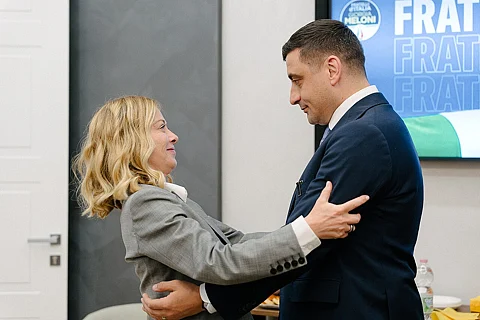

Just days before Romania’s high-stakes presidential runoff, far-right candidate George Simion launched a blistering attack on French President Emmanuel Macron, accusing him of “dictatorial tendencies” and interfering in Romanian democracy.
“I love France and the French people, but I don’t like Emmanuel Macron’s dictatorial tendencies,” Simion told French broadcaster CNews in a bilingual interview on Thursday. He alleged that Macron’s administration meddled in Romanian affairs, referencing a controversial meeting between France’s ambassador to Romania and the head of the Constitutional Court — the same court that annulled the original 2024 presidential election over Russian interference concerns.
“The French ambassador has gone through all regions of the country to convince businessmen to support my opponent, the mayor of Bucharest,” Simion added, referring to his centrist challenger, Nicușor Dan.
Simion, 38, is the leader of the far-right Alliance for the Union of Romanians (AUR), a party founded in 2019 that has quickly risen to become a major political force. He currently leads opinion polls ahead of Sunday’s runoff against Dan, a 55-year-old mathematician and independent who has served as mayor of Bucharest since 2020. Dan promotes a pro-European, pro-Western agenda, in contrast to Simion’s nationalist rhetoric.
Simion escalated his critique of France by comparing it to Iran, claiming the country has “lost its relationship with God” and is now ruled by elites akin to “ayatollahs.” He also condemned gender-affirming care for minors, warning that France was losing its identity as a European, Christian nation.
Rather than campaign domestically in the final days before the vote, Simion has embarked on a tour of European capitals, including London, Rome, Brussels, and Paris, seeking to rally the support of Romania’s six million-strong diaspora and forge international alliances. His foreign visits have included high-profile meetings with conservative leaders such as Italian Prime Minister Giorgia Meloni and Polish President Andrzej Duda.
“Many claimed we are anti-EU or anti-NATO. That’s not true,” Simion said in Brussels. “We are part of the European Conservatives and Reformists, the party of Giorgia Meloni and Mateusz Morawiecki.”
Simion cited Italy’s current right-wing government as a model, praising its stability and economic direction. In Warsaw, he expressed admiration for Poland’s conservative leadership, crediting Morawiecki and Duda with reversing brain drain and boosting national pride.
Despite his nationalist stance, Simion pledged to attract foreign investment and tap into Romania’s rich natural resources, including offshore gas and mineral reserves. He reiterated support for NATO and the European Union, while criticizing what he sees as geopolitical fragmentation between the U.S. and EU.
Simion also attempted to deflect accusations of Russian sympathies, stating: “Russia is the biggest risk for Romania. They killed our people and took our land under the Ribbentrop-Molotov Pact. But the greater danger is division within the free world.”
Sunday’s runoff follows the annulment of last year’s election, which was upended by the rise of ultra-nationalist Călin Georgescu. After his disqualification over Russian ties, Simion emerged as the new standard-bearer of Romania’s hard right.
Though he currently leads in POLITICO’s Poll of Polls with 49 percent to Dan’s 46 percent, forming a stable government may prove far more difficult. Simion has floated the idea of a “grand coalition” government that could include his opponent Dan — despite deriding him as “Macron’s guy.”
“I wouldn’t rule them out,” Simion said, noting Dan’s reputation for reform and anti-corruption policies.
Still, three of Romania’s four major parties — the center-right National Liberal Party (PNL), the centrist Save Romania Union, and the Hungarian minority party — have ruled out any alliance with Simion. They cite his far-right positions, anti-European rhetoric, and antagonism toward Ukraine as incompatible with Romania’s democratic values.
While the center-left Social Democratic Party (PSD) has not endorsed Dan and has remained open to future cooperation with Simion, European Socialists — PSD’s European partners — are pressuring the party to shun any far-right alliance.
Simion maintains that his priority will be economic revival and national unity. “We want peace, we want prosperity, and we want a strong Romania in Europe,” he said. Whether he can deliver on that promise — or form a viable coalition — will depend on the outcome of Sunday’s decisive vote.